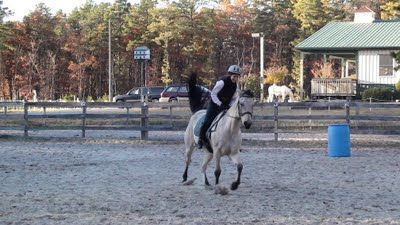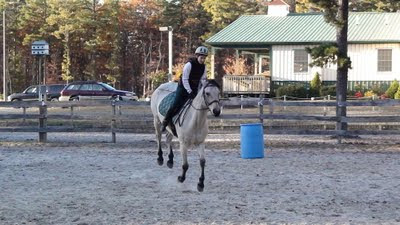Once in the ring, we warmed up slowly. Lots of walking followed by lots of trotting. He felt awesome. His back felt lifted under the saddle and he was reaching evenly to the bridle. I reminded him to keep the pace once in a while, but for the most part he was completely game. I reminded myself to carry my left wrist and tried to sit 50% of the time in posting. I took my time, letting both seat bones rest in the saddle before rising on the next beat. Harley felt so steady.
I decided to let his back warm up further with some sitting trot before cantering. I was very happy with the way he carried my seat. My teacher says that it should feel like there is a cloth under your seat and the cloth is being gently tugged forward with each stride. Your seat follows the tug and then returns to neutral.
I could feel this and the pulse of his hind legs. I carried the reins in my hands and he reached with a softly arched neck into the bridle. My aids felt really independent. I know that they are always supposed to be that way, but I found myself surprisingly aware. My outside leg touched his side for a turn and then relaxed down. My reins held for a moment, asking him to keep his tempo down the long side, and then softened. My seat matched my horse's rhythm and he matched my seat.
"You are as good as Hawaii, Harley. Better, because I get to see you all year round."
Now, it was time to canter. From the sitting trot, I changed my legs to canter position, steadied a little on the outside rein and he sprung into canter left. I remembered the feeling of connection we had experienced three weeks earlier and tried to recreate it. My legs hung down only touching him to encourage engagement. My hands were still and my seat was following.
Harley started bounding. Not big, long bounds. Short, rounded bounds, like when he cantered next to me at liberty. He was sort of bouncing from his hind to his front legs and tossing his mane enthusiastically. I felt secure in the saddle, but this was odd. When he persisted, I stopped him and studied his face. He wrapped his head and neck around and looked at me, which it typical MO for Harley.
"Are you okay, Boy?"
I was mildly concerned that something was wrong with him. Was he injured? Or just being playful? His expression did not show any signs of distress and his ears were relaxed.
"Let's try the other side."
I brought him around to the right and we picked up the new lead. The transition was easy and he quickly began the same bounding with extra mane tossing. I decided to keep going and see if he worked out of it, although it was pretty entertaining. After a couple circuits he settled somewhat, but still felt like he was picking his hind legs up rather high once in a while. Then it happened.
Pop.
Smooth flying change from right to left. I enjoyed my seat in the saddle for the flying and landing.
"Oh, that was what you were up to!"
Harley loves to change leads midair. He started offering flying changes when we were practicing canter figure eights the spring before last. I was thrilled by his talent, but I quickly learned to carefully ration my praise. When he learned that he could change leads with me on board, he became a flying change machine. Sometimes, I would ask for the canter and three strides in he would change unsolicited. This started to be a problem, when he wanted to change all the time. Any little shift or move that I made was a cue for him to change and these changes were not all smooth. Let's just say that there was more "fly" than was necessary!
I had purposely put them away and not asked or encouraged a change since the fall. I wanted to train canter to walk and canter half-pass, before returning to the changes, with the hope that he would be a little more...ehem...civilized about them. This was the first time that he had brought them back out since before the horse show in May. Thankfully, he decided to counter canter in the first level test instead of leap into the air. I had to giggle when I saw the judge's comment for the counter canter.
"Rushed".
You bet! And trying not to think flying or change or anything at all just so we could get through the loop without any theatrics.
But this ride was different. We had not cantered in nearly three weeks and he was ready. He wanted to have fun and flying changes are fun to him, so I decided to indulge him. We came across the diagonal in canter right, his preferred lead for changes, and I just sat there. I was baiting him, but hoping that he would wait for me. He did! No change. Good Boy.
We changed through trot and came down the next diagonal. I did not hesitate in asking him to trot this time and he did a one-step-trot change. Fine.
Now for the real deal. I brought him onto a short diagonal from the right lead. I kept my seat and my hands neutral. I asked for a little more engagement with the left hind before the center of the arena, then I switched my legs and just barely pressed with my new outside leg.
Leap. Change. Land.
Beautiful.
I praised him and let him canter the circle before coming back to trot. His trot felt outstanding. I guess gathering oneself for a change is an effective balancing movement. The basis of dressage.
I had hoped to make more progress with our other canter exercises before asking for these again, but his patience was much improved from the fall. With any luck, he will let me continue to train the canter to walk and half-pass. Maybe the flying change will be his reward, as long as he does not start taking liberties!
 |
| Landing a pretty smooth change in November, with extra tail and a smile. This was on my birthday. Thanks, Harley! |


Well that ride was worth coming home to!
ReplyDeleteI agree that a week of tropical paradise can't compare to all year long with our horses. Harley sounds like a very special guy. :)
Sounds pretty fun to me. I think he was glad to have you aboard!
ReplyDeleteMy horse makes me laugh!
ReplyDeleteIt was very fun and Harley is special, but he wants you to know that if he can do it, so can your special horse (or puppy)!
Very interesting to read! I need to get some photos of our canter transitions. Maybe Speedy's bucks are just "air time" and not so much bucking! :0)
ReplyDeleteThere you go!
ReplyDeleteHarley enjoys the work, that much is obvious! Lucky you and lucky horse to do what you love :)
ReplyDelete